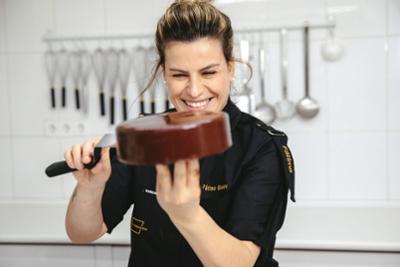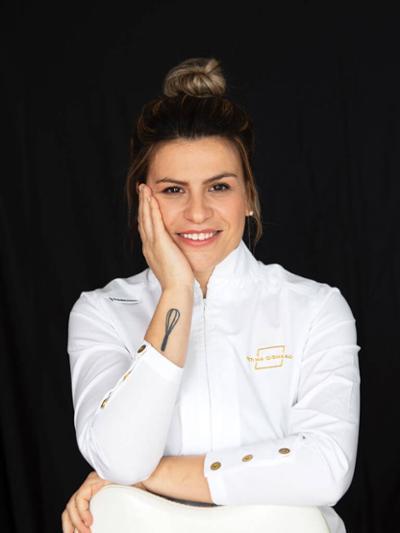

Fátima Gismero, "opening a bakery in a village is enriching"

Fátima Gismero says she is living a dream in the family bakery in Pioz and recognises that she has to adjust the menu to the time of year.
The granddaughter and daughter of bakers, she studied pastry making in Madrid and Barcelona, and worked with great chefs such as Carles Mampel and Jordi Roca before deciding to return in 2018 to the family bakery in Pioz (Guadalajara) to take over from her parents. In these years, Fátima Gismero has managed to put the small town on the map of haute pastry.
Named pastry chef revelation of Madrid Fusión in 2021, she is very happy to be able to develop her profession in her village and assures that there is no need to adjust prices because people who are looking for quality appreciate good work.
Rural Interview with pastry chef Fátima Gismero
1.-What are the advantages and disadvantages for a pastry chef working in a rural environment?
The biggest advantage of working in Pioz is that you are in a beautiful, healthy environment. On days when you have a lot of work or you can't do any more, it's wonderful to go out into the street, breathe fresh, clean air and see the castle. Being in the village is another thing, it's not better or worse than being in a capital city, but for me it's like a breath of fresh air.
Disadvantages? There are busy and slow seasons. In summer, Christmas and Easter we have more hustle and bustle. But come winter, people get cold and think more about coming to the village. The biggest disadvantage is that people have to move and above all the raw materials. Now they are gradually bringing in more products, but we have had a lot of problems with supply.
2.- What are the keys to being popular and attracting people from other nearby towns?
It is our products that make people know you, word of mouth. We have many villages near Pioz and in the end we all know each other. In the villages there are many families, they order the cake for an event or birthday, there are people who go to that birthday and so we reach many more people. The fact that we have a traditional cake section makes us special, people remember their grandparents, their ancestors and their childhood. Lately we've been making the flour and a lot of people write to me to ask if we're going to have one because it reminds them of when they were little, of when they used to go to their village. This is one of the beautiful things about this profession, I wanted people not to forget the tradition and where we come from, and I have succeeded.
3.- Does having a bakery in a village force you to adjust costs and adapt to the tastes of a very specific clientele? Or, on the contrary, does it allow you to be creative and experiment?
It doesn't matter whether you are in a village or in a capital city, the important thing is quality. If you give quality, you have to charge for it. Being in a village doesn't mean that you are going to do a worse job or buy inferior raw materials. One of the secrets is to follow your line and do it well. Maybe you come to the village and set up a Michelin star restaurant and it works phenomenally well. You put the brakes on, I have friends who have two Michelin stars who are in a godforsaken village in the middle of Albacete and they follow their concept, and it's the same for me. I want to do things well and I have chosen Pioz to stay at my parents' house and I believe that you don't have to adjust prices because people who want quality appreciate good work.
4.- Does the fact that you are not in a big city cause you any problems when it comes to getting all the products you need? Do you have to place larger orders or order more in advance?
We have to be more organised because there is one day a week that each supplier comes, there are some that need a minimum order. Now we have more volume and it is less of a problem, but at the beginning it was more difficult to get things delivered, they asked you more questions: where are you, how much are you going to spend, how much are you going to spend? As everything is moving forward, couriers and parcels are arriving well. Although if something is missing at the last minute because I've forgotten it or the suppliers have forgotten it, I have to take the car and go to the warehouse in Madrid because it's urgent.
5.- Do factors such as the weather influence the normal running of the bakery?
We adapt our bakery to the weather. In summer we have a cooler bakery, in winter we are more chocolaty. We adapt our product range to our customers and to the time of year. If it rains or snows, people don't come. I remember that with La Filomena we had to close, but that was exceptional. Of course, we usually have to keep an eye on the weather to know the forecasts for the products we make each week.
6.- What message would you give to all those colleagues who want to set up in a village but have not yet taken the plunge?
For me it is very important to be sure about where you want to settle. It is true that it takes courage, and I understand that there are doubts. You also have to make a study before opening any kind of business, but if it is your dream, I encourage you to pursue it and go for it.
I am very much a person who encourages my colleagues and friends to become entrepreneurs and to be their own bosses and owners of their work. I encourage everyone who wants to start a business in the rural world because it is a different way of life, very enriching. I am happy, very happy, to be able to be in my village and above all when my customers thank me for having a delicious bakery. I am fulfilling my dream and I am very happy when my customers say this to me.





